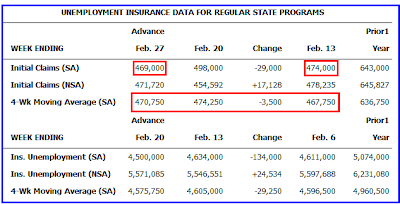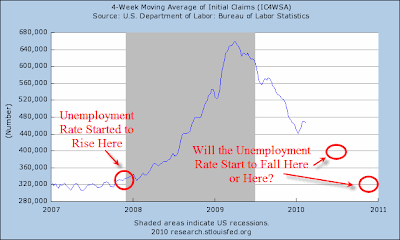Weekly Unemployment Claims At 469,000; Prepare for Friday’s BLS Snow Job
Courtesy of Mish
Inquiring minds are investigating the Unemployment Weekly Claims Report for March 4, 2010.
In the week ending Feb. 27, the advance figure for seasonally adjusted initial claims was 469,000, a decrease of 29,000 from the previous week’s revised figure of 498,000. The 4-week moving average was 470,750, a decrease of 3,500 from the previous week’s revised average of 474,250.
Weekly Unemployment Claims
The weekly claims numbers are volatile so it’s best to focus on the trend in the 4-week moving average. That 4-week average has not show any improvement for quite some time.
4-Week Moving Average of Initial Claims
4-Week Moving Average of Initial Claims Detail
The 4-week moving average of claims for the last three weeks is above where it was on December 12, 2009 and just slightly better than it was on December 5, 2009. By this measure, the recovery has stalled.
Blaming The Weather
A week ago in "Nascent" Recovery or "Nascent" Economic Collapse? I noted how economists were blaming the weather for last week’s rise in weekly claims and possible jump in the monthly job report.
Weather Related Questions
I have a few simple questions for all the dim-bulb economists now blaming the weather:
- "Did you not know there was a snowstorm on the East coast?"
- "If you did, then why didn’t you factor it in to your estimates?"
- "How can you be surprised by something you knew?"
Bernanke’s Snow Job
To refresh your memory, last week Bernanke blamed the weather for the jump in claims and warned about overinterpreting the data.
From Yahoo Finance Jobless claims rise due to weather-related factors.
"Federal Reserve Chairman Ben Bernanke told a congressional committee that the snowstorms are likely to have a short-term — but not permanent — effect on unemployment and layoffs. He said policymakers will "have to be careful about not overinterpreting" the upcoming data."
Summers Shovels Snow
Inquiring minds are reading Summers Shovels Snow on Winter’s Job Prospects by Caroline Baum.
Summers came out of virtual retirement Tuesday to tell CNBC the blizzards last month were likely to distort February’s employment statistics. It’s “very important to look past whatever the next figures are to gauge the underlying trends,” the White House economic adviser said in a TV interview.
What he really meant was, it’s important to look past bad numbers.
At the risk of inspiring accusations of naivete from conspiracy theorists convinced government agencies cook up the numbers in the basement, I decided to go to the source.
The only people who know the numbers several days before the release work at the Bureau of Labor Statistics, according to Tom Nardone, assistant commissioner for current employment analysis at the BLS.
“Larry Summers did not have the number when he made his comment,” Nardone said.
Economists surveyed by Bloomberg News expect a decline of 65,000 in February non-farm payrolls. Trotting out Summers to lay the groundwork for what clearly isn’t good news and what could be worse news is standard operating procedure for any White House. Why traders are so invested in their conspiracy theories is beyond me.
Now let’s turn to the weather. There were two snowfalls that overlapped with the survey reference period last month: Feb. 4-7 and Feb. 9-11. For the household survey, if you have a job and were absent in the reference week, you are counted as employed whether or not you were paid. You can read about it here: Who is counted as employed?
The survey of establishments is a bit trickier. If you were paid for work you did in any part of the pay period that includes the 12th of the month, whether you worked or not, worked a full or reduced week, you are counted as employed, Nardone says. If you didn’t work that week but got paid, you’re still counted. You can read the BLS definition of employment here: What is the CES definition of employment?
Only if you didn’t receive any pay for the entire pay period are you not counted as employed. (The federal government closed its Washington offices for four of five work days, and those folks got paid.)
What categories of workers would be affected? Primarily part-time workers and new hires as counted in the payroll survey.
Temporary Distortions
The fact that the blizzards last month affected highly populated areas along the East Coast and occurred during the key week for both surveys suggests there will be some depressing effect on payrolls. The major effect will be reflected in a reduction in hours worked.
Here’s the good news: What the weather taketh away in February, it giveth back in March and April. All the distortions are temporary. Businesses with a long-term outlook aren’t about to change hiring plans because of a few feet of snow.
A month from now, if the expected snapback in employment is too robust, Summers might be back to damp enthusiasm about employment growth that’s too good to be true.
Thanks Caroline, But Who Wants Facts?
Summers and Obama will be happy to take credit for the improvement in March (if any) but continue to blame the weather if there is no snapback.
Indeed, Summers purposely laid the groundwork for blaming the weather for Friday’s report no matter what it is. Moreover, Summers and Bernanke (no conspiracy here – just each acting individually in their own best interest to buy time) trotted out statements practically begging economists to overshoot their estimates of snow damage.
Finally, while all this talk is on snow, there is next to no talk about how hiring a million census workers will temporarily affect the jobs statistics. That "temporary" effect is likely to last until June, but don’t expect Summers to talk about that.
Instead expect economists to be surprised tomorrow no matter what the number.
Surprise Surprise Surprise
For all of Bernanke’s and Summers’ attempted snow jobs, it should be intuitively obvious that the "primary effect will be reflected in a reduction in hours worked" on the East coast as noted by Baum. The unemployment rate should not be impacted at all.
Nonetheless, I am looking forward to three surprises tomorrow.
1. The jobs report was much better than expected in light of the snow
2. The jobs report was much worse than expected because of the snow
3. The unemployment rate was much worse and much better than expected because of the snow.
Expect economists, easily surprised by anything and everything, to be surprised by all of the above, at the same time. Pay no attention to the obvious conflicts in the above projected surprises. Economists are seldom concerned with logic. Thus, when Friday’s job report is out, don’t be surprised by economists being surprised about multiple conflicting things.





